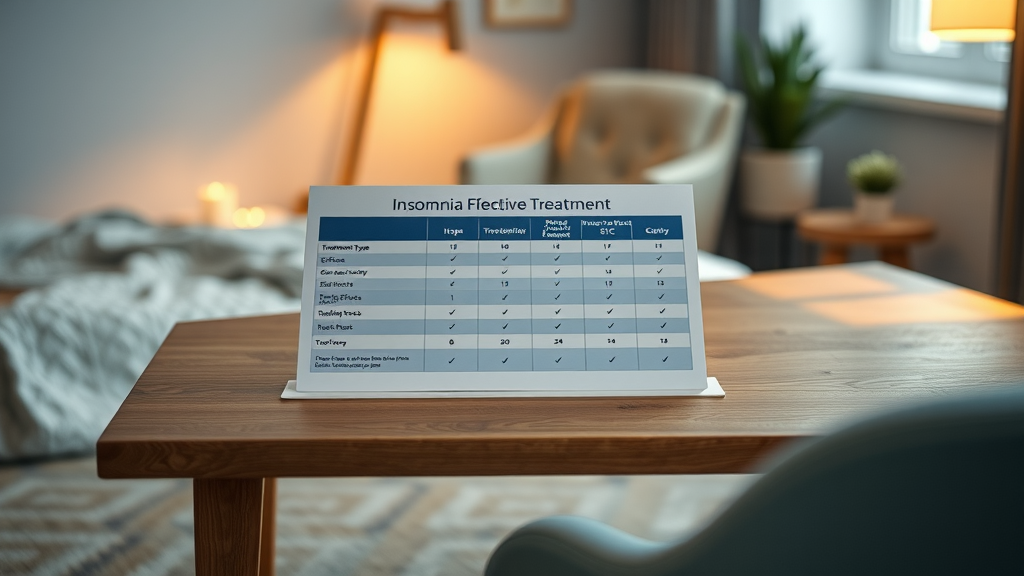Are sleepless nights leaving you exhausted and frustrated? You're not alone. Insomnia affects millions, yet many suffer in silence, unaware of the effective treatment options available. In "Don't Suffer in Silence: Effective Insomnia Treatment Options," we delve into the causes of insomnia and unveil practical solutions that can transform your nights from restless to restful. By mastering these strategies, you can reclaim your sleep, boost your mood, and enhance your overall well-being. Let’s explore how to break free from the cycle of sleeplessness together!
Understanding Insomnia: Causes and Effects
What is Insomnia?
Insomnia is a common sleep disorder characterized by difficulty falling asleep, staying asleep, or waking up too early and not being able to go back to sleep. This condition can lead to daytime fatigue, mood disturbances, and a decline in overall health. Insomnia can be classified into two types: acute insomnia, which lasts for a short period, and chronic insomnia, which occurs at least three times a week for three months or longer. Understanding insomnia is crucial for effective insomnia treatment.
Common Causes of Insomnia
There are numerous factors that can contribute to insomnia, including:
- Stress and Anxiety: Worries about work, health, or family can keep your mind racing at night.
- Medical Conditions: Chronic pain, asthma, and other health issues can disrupt sleep.
- Medications: Some prescriptions can interfere with sleep patterns.
- Caffeine and Alcohol: Consuming these substances, especially close to bedtime, can hinder your ability to fall asleep.
- Irregular Sleep Schedule: Shift work or frequent travel can disrupt your body's natural circadian rhythm.
Effects of Insomnia on Daily Life
The effects of insomnia extend beyond just feeling tired. Chronic insomnia can lead to serious health issues, including:
- Impaired Cognitive Function: Difficulty concentrating and memory problems.
- Emotional Distress: Increased risk of anxiety and depression.
- Physical Health Issues: Higher risk of conditions like heart disease and diabetes.
- Decreased Quality of Life: Reduced productivity and social interactions.
What You'll Learn About Insomnia Treatment
Overview of Treatment Options
Effective insomnia treatment can vary based on the underlying causes. Options include lifestyle changes, cognitive behavioral therapy, medications, and alternative therapies. Understanding these options can empower you to make informed decisions about your sleep health.
Lifestyle Changes for Better Sleep
Making simple lifestyle adjustments can significantly improve your sleep quality. Consider the following:
- Establish a Sleep Schedule: Go to bed and wake up at the same time every day.
- Create a Relaxing Bedtime Routine: Engage in calming activities before bed, such as reading or taking a warm bath.
- Limit Screen Time: Reduce exposure to screens at least an hour before bedtime.
- Avoid Large Meals Before Bed: Eating heavy meals can disrupt sleep.
Cognitive Behavioral Therapy for Insomnia (CBT-I)
CBT-I is a structured program that helps individuals identify and replace thoughts and behaviors that cause or worsen sleep problems. This therapy is highly effective and often recommended as a first-line treatment for chronic insomnia.
Medications for Insomnia Treatment
While medications can provide short-term relief, they are not a long-term solution. Common sleep aids include:
- Prescription Sleep Medications: Such as benzodiazepines and non-benzodiazepine sedatives.
- Over-the-Counter Sleep Aids: Antihistamines can help but may cause next-day drowsiness.
Alternative Therapies for Insomnia
Alternative therapies, such as acupuncture, yoga, and herbal supplements, can also be beneficial. These methods focus on relaxation and stress reduction, which can improve sleep quality.
Effective Strategies for Managing Insomnia
Creating a Sleep-Conducive Environment
Your sleep environment plays a crucial role in your ability to fall asleep and stay asleep. Ensure your bedroom is dark, quiet, and cool. Consider using blackout curtains, earplugs, or a white noise machine to enhance your sleep environment.
Establishing a Sleep Routine
Consistency is key when it comes to sleep. Establishing a regular sleep routine can help signal to your body that it’s time to wind down. Aim for 7-9 hours of sleep each night and avoid napping during the day.
Mindfulness and Relaxation Techniques
Practicing mindfulness and relaxation techniques, such as meditation or deep breathing exercises, can help calm your mind and prepare your body for sleep. These techniques can reduce anxiety and promote a sense of peace before bedtime.
Diet and Exercise for Better Sleep
Regular physical activity can help you fall asleep faster and enjoy deeper sleep. However, avoid vigorous exercise close to bedtime. Additionally, be mindful of your diet; avoid caffeine and heavy meals in the evening.
People Also Ask
What is the fastest way to cure chronic insomnia?
While there is no one-size-fits-all solution, cognitive behavioral therapy for insomnia (CBT-I) is often considered the most effective and fastest way to address chronic insomnia.
Is there a cure for insomnia?
Insomnia can often be managed effectively with lifestyle changes, therapy, and medications, but it may not have a definitive "cure." Addressing underlying causes is essential for long-term relief.
How to deal with sleepless nights?
Implementing a calming bedtime routine, avoiding stimulants, and creating a comfortable sleep environment can help manage sleepless nights.
Why does insomnia happen?
Insomnia can occur due to various factors, including stress, medical conditions, medications, and lifestyle choices. Identifying the root cause is crucial for effective treatment.
Tables: Comparing Insomnia Treatment Options
| Treatment Type | Effectiveness | Side Effects | Duration of Treatment |
|---|---|---|---|
| Medications | Short-term relief | Next-day drowsiness, dependency | As needed |
| CBT-I | Long-term effectiveness | None | 8-12 weeks |
| Alternative Therapies | Varies | Minimal | Ongoing |
Quotes from Sleep Experts
“Sleep is the best meditation.” - Dalai Lama
Lists of Tips for Better Sleep
Top 10 Tips for Managing Insomnia
- Stick to a sleep schedule.
- Create a relaxing bedtime routine.
- Limit screen time before bed.
- Avoid caffeine and alcohol in the evening.
- Make your bedroom comfortable and dark.
- Engage in regular physical activity.
- Practice relaxation techniques.
- Limit naps during the day.
- Keep a sleep diary to track patterns.
- Consult a healthcare provider if insomnia persists.
FAQs About Insomnia Treatment
What are the most common insomnia treatments?
The most common treatments include lifestyle changes, cognitive behavioral therapy for insomnia (CBT-I), and medications.
How long does it take for insomnia treatments to work?
Results can vary; however, CBT-I typically shows improvements within 4-8 weeks, while medications may provide immediate relief.
Key Takeaways on Insomnia Treatment
Summary of Effective Treatment Options
Effective insomnia treatment involves a combination of lifestyle changes, therapy, and, if necessary, medications. Understanding your specific needs and triggers is essential for finding the right approach.
Conclusion: Taking Action Against Insomnia
Encouragement to Seek Help
If you are struggling with insomnia, it’s important to seek help. Don’t suffer in silence; there are effective treatment options available that can help you regain control of your sleep and improve your quality of life. For more insights on health and wellness, consider exploring wearable tech for health or exclusive health insights.
Video: Understanding Insomnia and Its Treatments
A comprehensive overview of insomnia and treatment options.





 Add Row
Add Row  Add Element
Add Element 



Write A Comment